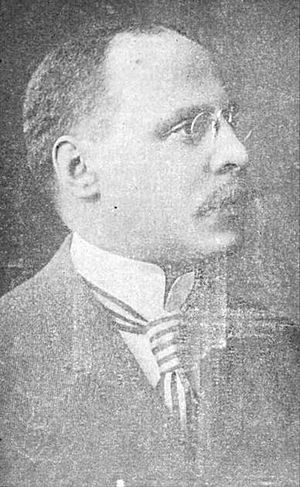Charles Edwin Bentley facts for kids
Quick facts for kids
Charles Edwin Bentley
|
|
|---|---|

Charles E. Bentley, c. 1913
|
|
| Born | February 1, 1859 |
| Died | October 13, 1929 (aged 70) |
| Nationality | American |
| Occupation | Dentist |
Charles Edwin Bentley (1859–1929) was an important American dentist. He was also a strong leader for African American civil rights. In Chicago, he helped start a huge dental group. He also played a key role in the Niagara Movement and the National Association for the Advancement of Colored People (NAACP).
Contents
Who Was Charles E. Bentley?
Charles E. Bentley was born in 1859 in Cincinnati, Ohio. He grew up there and went to school. He became a dentist, which means he was a doctor who takes care of teeth.
Early Life and Dental Career
In 1887, Charles Bentley finished his dental studies. He earned his Doctor of Dental Surgery degree. This was from the Chicago College of Dental Surgery. He then opened his own dental office.
In 1888, Dr. Bentley helped start a group called the Odontographic Society. He was the first president of this group. It grew to be the biggest local dental society in the world. This group helped dentists learn new things.
In 1903, the Odontographic Society held a big meeting. Three thousand dentists attended. Nearly one thousand dental students also came. In 1911, this society joined with the Chicago Dental Society. Dr. Bentley helped make this merger happen.
Helping Kids' Teeth
Dr. Bentley cared a lot about children's health. He suggested that the Odontographic Society study kids' teeth. They looked at the mouths and teeth of children in schools.
One year later, Dr. Bentley shared their findings. This report was published in a dental magazine. It became a very important study. It helped guide future work on children's dental care.
Fighting for Equal Rights
Beyond dentistry, Dr. Bentley was a civil rights activist. This means he worked to make sure all people had equal rights. He was a founder of the Niagara Movement. This was an early group that fought for civil rights for African Americans.
He was also a leader in the Chicago branch of the NAACP. The NAACP is a very important organization. It works to end unfair treatment based on race. Dr. Bentley helped lead their efforts in Chicago. He was also the first president of the Equal Opportunity League of Chicago.
His Legacy
Dr. Bentley wrote many articles about dentistry. He also led a special exhibit on dentistry for child welfare. For many years, he was the secretary of Provident Hospital. This hospital was important for the African American community.
In 1898, Charles Bentley married Florence Lewis. She was a writer and editor for a newspaper. Charles E. Bentley passed away in 1929. He is remembered for his work as a dentist and a civil rights leader.
 | Leon Lynch |
 | Milton P. Webster |
 | Ferdinand Smith |

